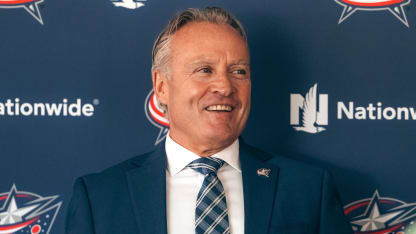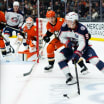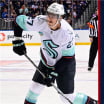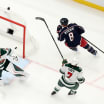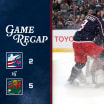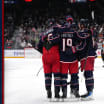Dean Evason has done it all in hockey, and his first head coaching job was no different.
The new Blue Jackets head coach enjoyed plenty of success in parts of five seasons at the helm in Minnesota, leading the Wild to four playoff appearances as well the best season in franchise history, but also saw his tenure end as it does for most NHL coaches – being dismissed last season after a slow start.
Add it all up, though, and his tenure in Minnesota was largely a success, with Evason’s .639 points percentage seventh all-time among NHL coaches with at least 250 games behind the bench.
Now in charge of the Blue Jackets, the longtime player and coach hopes to try to establish a team-first culture of accountability in Columbus just as he did in Minnesota.
How will he go about doing so, and what has he learned throughout a lifetime in hockey – including his Minnesota tenure?
After his introductory press conference Tuesday, Evason answered these five questions from BlueJackets.com.
Hockey coaches talk about culture all the time, and you mentioned accountability a lot today in your press conference. As a coach, how do you instill those types of attributes in a locker room?
“You have to talk about it, but you have to show it too, right? When you want to talk about accountability, first off, I better be accountable, too. If I make a mistake, they better know that I’m accountable for my mistake and I own it. The players will know that. It’s just the honesty. I think honestly, if you talk a lot about the team first, then the players start holding each other accountable. That’s the best, right? It’s one thing for the coach or the coaching staff to hold the players accountable, but when the players hold each other accountable, I think that’s when you have something.”
You have a lot of experience in the game, but Minnesota was your first head coaching job. Being in the big chair is a little bit different than any other challenge. I’m sure you have reflected a lot over the last year, so what do you feel like you learned about the job?
“There’s a lot of responsibility. That’s why you have to surround yourself with a fantastic coaching staff, and when I say coaching staff, that doesn’t just mean the coaches. It’s the video guys. It’s the trainers. It’s the medical and equipment (staffs), plus your strength and fitness guys. You have to have a real good team. And when I talk about our team and being team-first and making each other accountable, that is the exact thing we want to have in our coaches room as well.
“Have I learned a lot? Absolutely. I can go into great detail about the different things that I’m gonna change and tweak and try that I didn’t do, or that I did and I’m like, I’m not doing that again. But the bottom line is you get better. I know that I’m a better coach today than I was the day I got fired, and I’m looking forward to putting that into play.”
Out of curiosity, you had a whole season essentially to be on the sidelines. Did you pay a lot of attention to the game, or did you need a mental break? I assume you wanted to do this again, so how did you approach the rest of last year?
“You know any coach, you don’t get away. You don’t. Even if you’re not watching, you’re constantly thinking, ‘Maybe I should do this.’ You start writing things down. You dictate on your phone now. I used to have a notepad on the side of the bed that you’d wake up at 3 in the morning to write down a drill or whatever. Now you just talk into your phone and put it back down and go to sleep. So yeah, it’s a constant thing. It’s constantly evolving, and I say that the bottom line is, hockey hasn’t changed in a long time. It’s still put the puck in the net, keep it out of the net. So we have to figure out ways to do that.”
You were a player who scored a lot of goals in junior and got to the NHL and had to play a more combative style of game. How much did your playing career inform the way you coach because you could probably draw from a lot of experiences?
“100 percent. I think you have to do that, and I think as an ex-player, you do that. But you have to be careful not to be like, ‘When I played...’ No. It’s completely different from when I played. But I do know what it’s like to get sat out as a fourth line guy. I do know what it’s like to play eight minutes. But I also know what it’s like to play 28 minutes in junior. So yes, you have to build on that, but the one thing I ask of our group is, will you do anything to play in the National Hockey League? And a lot of guys will. A lot of guys will do anything to play in the National Hockey League, and that’s what I had to do. Whatever it took to play in the National Hockey League, if that meant checking, if it meant maybe some physicality, maybe a fight here and there, I had to do it. But will you take it the next step – will you do anything to win? A lot of guys will do anything to play in the National Hockey League, but now that you’re here, will you do anything to help your team win? That’s the challenge for your group.”
I want to ask how you got into coaching. Was it something you thought about during your playing career, or did the opportunity just come along?
“Honestly, when I ended my NHL career, I thought I was going to get another deal. I got bought out by the Calgary Flames, and Andy Murray asked me to go to Team Canada as a player and assistant coach. I played the year as a coach and got the bug. What are you going to do when you finish hockey? Well you know, there’s not enough money to retire at the time. I honestly thought if I made 100 grand in this league that I’d be rich and I’d be able to retire for the rest of my life. But that’s not it. But more important than the money, it tweaked me that, 'Wait, I can still win the Stanley Cup doing this? I’ll do it. I’ll do whatever it takes.' I still get on the ice. I still feel that heat, that passion. I still take heat, which is a bad feeling, but the high feeling is pretty high. I didn’t think I’d be a coach when you’re a player because you’re so tunnel-visioned and that’s all you want to do, but as my career ended, yeah, that’s what I wanted to do.”

